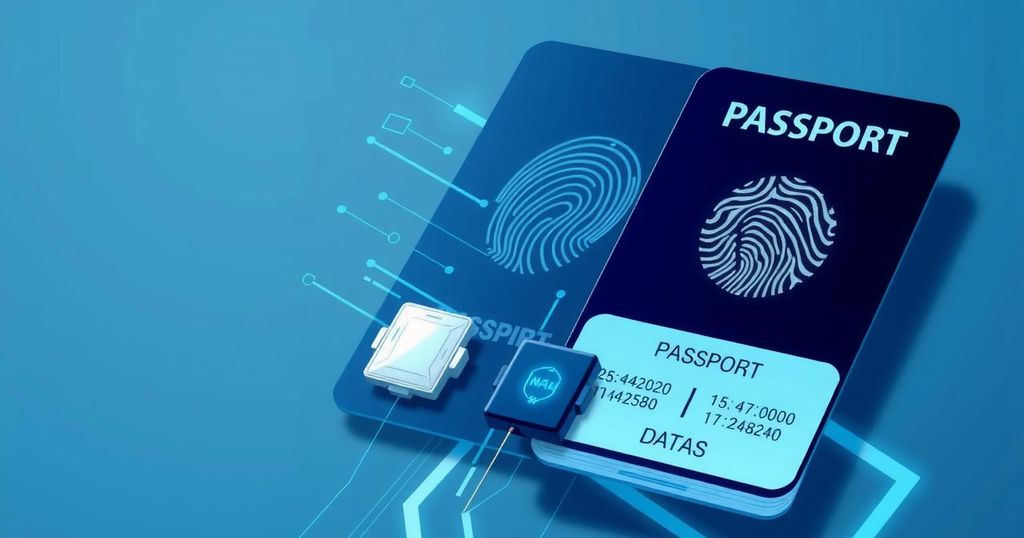Countries are increasingly adopting Electronic Passports (ePassports), enhancing travel documentation security, efficiency, and biometric identity verification. These advanced documents help reduce fraud, with over 150 countries adopting standards from the ICAO. However, they also raise privacy concerns, highlighting the need for informed navigation. Consulting services are evolving to support individuals in this new identity landscape.
The global transition to Electronic Passports (ePassports) marks a significant evolution in travel documentation, elevating security and efficiency. As nations integrate advanced surveillance technologies and digitize border controls, ePassports emerge as a crucial tool for authenticating identities and enabling swift international mobility. This modernization requires a reassessment of privacy policies, identity management, and legal pathways for individuals navigating this new landscape, as advised by Amicus International Consulting.
An ePassport is a government-issued document that features a microchip capable of storing biometric data, which may include fingerprints and facial images. This chip also contains personal details such as the passport holder’s name and nationality, along with a digitally signed certificate aimed at confirming the document’s authenticity and preventing tampering. This system transitions from traditional passports, which depend solely on printed information, to a more sophisticated identification method leveraging encrypted data.
Over 150 countries have begun implementing ePassports, guided by standards from the International Civil Aviation Organization (ICAO). In Australia, the introduction of ePassports in 2005 led to a 40% decline in forgery incidents and significantly reduced airport wait times. The Netherlands’ ePassport program initiated in 2006 noted a critical reduction in identity theft, revitalizing their customs and immigration processes. Similarly, Singapore’s Changi Airport has adopted automated systems that assess more than 70% of travellers without further intervention.
ePassports differ fundamentally from traditional passports, which can be altered easily. Key innovations in ePassports include enhanced encrypted biometric data, fast-scanning machine-readable zones (MRZs), and tamper-resistant features like holograms and UV-reactive inks. Together, these advancements provide more protection against fraud and identity theft, addressing significant concerns for border control agencies.
Security protocols for ePassports encompass multiple biometric verifications, such as facial recognition, fingerprint matching, and in some instances, iris scanning. The embedded chip uses Advanced Encryption Standard (AES) for data protection, ensuring that unauthorized access to the information stored is nearly impossible without government-level keys. All ePassports must comply with ICAO Document 9303 standards, promoting their global interoperability and expediting identification processes at international borders.
Despite their stringent security measures, ePassports are not immune to abuse. One incident involved a British banker, sought by authorities for embezzlement, who was arrested attempting to escape with a forged passport after failing biometric checks. A Chinese tycoon faced similar issues, being apprehended while attempting to re-enter Asia with an altered appearance despite having a legally issued passport.
Beyond protecting identities, ePassports enhance the travel experience by facilitating faster airport processing, reducing wait times, and minimizing paperwork, whilst boosting global trust. However, along with these advantages, ePassports introduce complexities surrounding privacy and individual surveillance, as each use is logged, creating potentially intrusive digital footprints.
Amicus International Consulting, aware of the challenges presented by biometric identity management, seeks to assist individuals, including journalists and high-net-worth clients, in navigating privacy concerns. Their services include citizenship-by-investment programs and identity change consulting, aimed at preserving client privacy in a world dominated by digital tracking. “We live in a time where a fingerprint or facial scan can open borders—or close them permanently,” a spokesperson stated.
The horizon of travel and identity is set to expand further as innovations like blockchain passports and AI-based biometrics emerge. A 2024 pilot in Finland explored a digital-only passport via mobile devices with no security breaches reported, suggesting possibilities for secure and streamlined travel in the future.
Ultimately, ePassports signify the dawn of a new era in travel. They function as a digital key for identity verification; as adoption grows, individuals must remain vigilant about how their biometric data is managed and shared. While offering convenience, ePassports raise paramount questions of privacy and data sovereignty. For those seeking new beginnings in a biometric world, Amicus International Consulting can assist in navigating these evolving challenges.
The global adoption of ePassports signifies a transformative era in travel and identity management, offering enhanced security, speed, and efficiency. While these advanced passports increase convenience for legitimate travelers, they also introduce privacy concerns and surveillance implications. As countries continue to implement ePassports, it is crucial for individuals to understand their rights regarding biometric data usage. Amicus International Consulting is positioned to guide clients through these complexities, ensuring they can navigate this new landscape securely.
Original Source: newswire.net







